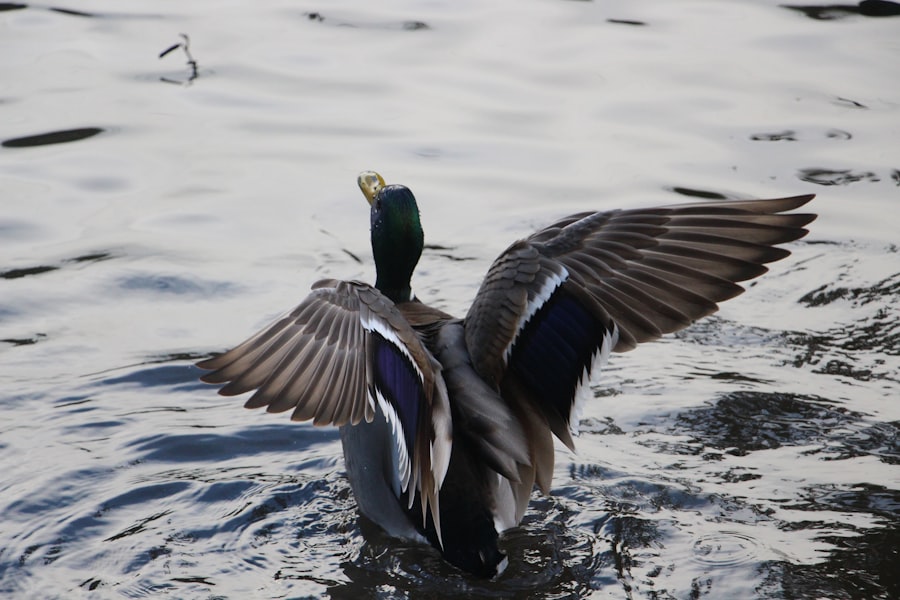Duck egg breeds have been gaining popularity in recent years due to their unique qualities and benefits. Duck eggs are known for their rich flavor, larger size, and higher nutritional value compared to chicken eggs. There are several different breeds of ducks that are specifically raised for their eggs, each with its own distinct characteristics and qualities. These breeds are often chosen for their egg-laying abilities, temperament, and adaptability to various climates and environments. Whether you are a small-scale farmer, homesteader, or simply a lover of duck eggs, understanding the different breeds and their specific traits is essential for successful egg production.
Table of Contents
Key Takeaways
- Duck egg breeds come in a variety of sizes, colors, and temperaments, making them a popular choice for backyard farmers and homesteaders.
- Popular duck egg breeds include the Pekin, Khaki Campbell, and Indian Runner, each with their own unique characteristics and egg-laying abilities.
- Duck egg breeds are known for their high egg production, rich and flavorful eggs, and ability to forage for their own food, making them a valuable addition to any farm or homestead.
- Duck eggs are a nutritious alternative to chicken eggs, with higher levels of protein, omega-3 fatty acids, and other essential nutrients.
- Proper care and maintenance of duck egg breeds includes providing a suitable living environment, balanced diet, and regular health checks to ensure their well-being and egg production.
Popular Duck Egg Breeds
Some of the most popular duck egg breeds include the Khaki Campbell, Indian Runner, and Pekin ducks. The Khaki Campbell is a prolific egg layer, known for its ability to produce up to 300 eggs per year. This breed is also prized for its calm and friendly demeanor, making it a popular choice for backyard flocks. The Indian Runner duck is another highly productive egg layer, known for its upright stance and distinctive appearance. This breed is often favored for its ability to forage and adapt well to free-range environments. The Pekin duck is a large, white breed that is known for its excellent egg production and meat quality. Pekin ducks are also known for their calm temperament and adaptability to various climates, making them a popular choice for both egg and meat production.
Characteristics of Duck Egg Breeds
Duck egg breeds come in a wide variety of sizes, colors, and temperaments. Some breeds, such as the Khaki Campbell and Indian Runner, are known for their prolific egg-laying abilities, while others, like the Pekin duck, are prized for their large size and meat quality. In addition to their egg-laying abilities, duck breeds also vary in terms of their temperament and adaptability to different environments. Some breeds are more docile and friendly, making them suitable for backyard flocks, while others are more independent and suited to free-range or commercial production. Understanding the specific characteristics of each breed is essential for choosing the right ducks for your particular needs and goals.
Duck egg breeds also vary in terms of their physical appearance and coloration. Some breeds, such as the Khaki Campbell, have distinctive plumage patterns and colors, while others, like the Pekin duck, are known for their pure white feathers. These physical characteristics can add to the aesthetic appeal of a flock and may also influence breeding and selection decisions. Additionally, some breeds are better suited to specific climates and environments, so it is important to consider these factors when choosing which duck egg breeds to raise.
Benefits of Duck Eggs
Duck eggs offer several unique benefits compared to chicken eggs. They are known for their rich flavor, larger size, and higher nutritional value. Duck eggs have a higher fat content than chicken eggs, which contributes to their rich and creamy texture. They also have larger yolks and thicker whites, making them ideal for baking and cooking. In terms of nutrition, duck eggs are higher in protein, vitamins, and minerals compared to chicken eggs. They are particularly rich in vitamin B12, which is essential for brain function and overall health. Additionally, duck eggs are often favored by individuals with allergies to chicken eggs, as they are less likely to cause allergic reactions.
In addition to their culinary benefits, duck eggs also offer advantages in terms of production and sustainability. Duck breeds are known for their prolific egg-laying abilities, with some breeds capable of producing up to 300 eggs per year. This makes them a valuable source of protein and nutrition for small-scale farmers and homesteaders. Duck eggs are also known for their long shelf life, making them an excellent option for preserving and storing surplus eggs. Overall, the unique qualities and benefits of duck eggs make them a valuable addition to any farm or homestead.
Care and Maintenance of Duck Egg Breeds
Proper care and maintenance are essential for ensuring the health and productivity of duck egg breeds. Ducks require adequate shelter, access to clean water, nutritious feed, and protection from predators. Providing a suitable environment for ducks to thrive is crucial for egg production and overall well-being. Ducks also require regular access to water for bathing and preening, as well as space to forage and exercise. Additionally, regular health checks and preventative measures should be taken to ensure that ducks remain healthy and free from disease.
Duck egg breeds also require specific dietary needs to support optimal egg production and overall health. A balanced diet that includes a high-quality layer feed, fresh greens, and access to insects or other protein sources is essential for meeting the nutritional needs of ducks. It is important to provide ducks with access to clean water at all times, as they require water for digestion and overall health. Additionally, providing supplemental calcium in the form of crushed oyster shells or limestone can help support strong eggshells and overall reproductive health.
Breeding and Raising Duck Egg Breeds

Breeding and raising duck egg breeds requires careful consideration of genetics, breeding methods, and overall flock management. Selecting breeding stock with desirable traits such as prolific egg-laying abilities, good temperament, and adaptability is essential for producing high-quality offspring. Breeding ducks should be chosen based on their individual characteristics and overall conformation to breed standards. Additionally, proper mating ratios should be maintained to ensure genetic diversity and overall flock health.
Raising ducklings requires attention to proper brooding methods, nutrition, and overall care. Ducklings should be provided with a warm and secure brooding area equipped with heat lamps or other heating sources. They should also be provided with a high-quality starter feed that meets their specific nutritional needs. As ducklings grow, they should be gradually transitioned to a grower feed that supports their overall development and growth. Providing ducks with access to outdoor space for exercise and foraging is also important for their overall well-being.
Conclusion and Final Thoughts on Duck Egg Breeds
In conclusion, duck egg breeds offer unique qualities and benefits that make them a valuable addition to any farm or homestead. Understanding the different breeds, their specific characteristics, and requirements is essential for successful egg production and overall flock management. Whether you are interested in raising ducks for their prolific egg-laying abilities, rich flavor, or nutritional value, there are several breeds to choose from that can meet your specific needs and goals.
Proper care and maintenance of duck egg breeds is crucial for ensuring the health and productivity of ducks. Providing ducks with adequate shelter, clean water, nutritious feed, and protection from predators is essential for their overall well-being. Additionally, understanding the specific dietary needs of ducks and providing proper breeding and raising methods is important for successful egg production and overall flock management.
Overall, duck egg breeds offer several unique benefits that make them a valuable addition to any farm or homestead. Their rich flavor, larger size, higher nutritional value, prolific egg-laying abilities, and overall adaptability make them an excellent choice for individuals interested in sustainable food production and self-sufficiency. With proper care and management, duck egg breeds can provide a valuable source of protein, nutrition, and enjoyment for years to come.
If you’re interested in learning more about duck egg breeds, you might also want to check out this informative article on the importance of providing a comfortable and secure chicken coop for your feathered friends. The article discusses the benefits of having a well-designed coop, such as the ones available at Poultry Wizard, which can contribute to the overall health and productivity of your ducks and other poultry.
FAQs
What are some popular duck egg breeds?
Some popular duck egg breeds include the Khaki Campbell, the Indian Runner, the Pekin, and the Welsh Harlequin.
What are the characteristics of Khaki Campbell ducks?
Khaki Campbell ducks are known for their prolific egg-laying abilities, with some hens laying up to 300 eggs per year. They have a khaki-colored plumage and are a relatively calm and friendly breed.
What are the characteristics of Indian Runner ducks?
Indian Runner ducks are known for their upright, penguin-like stance and their excellent egg-laying abilities. They come in a variety of colors and are known for their active and curious nature.
What are the characteristics of Pekin ducks?
Pekin ducks are large, white ducks known for their meat production as well as their egg-laying abilities. They have a calm and friendly temperament and are popular for both backyard and commercial duck farming.
What are the characteristics of Welsh Harlequin ducks?
Welsh Harlequin ducks are known for their beautiful silver or gold plumage and their excellent egg-laying abilities. They are a relatively new breed, developed in Wales in the 1940s, and are known for their calm and friendly nature.
Meet Walter, the feathered-friend fanatic of Florida! Nestled in the sunshine state, Walter struts through life with his feathered companions, clucking his way to happiness. With a coop that’s fancier than a five-star hotel, he’s the Don Juan of the chicken world. When he’s not teaching his hens to do the cha-cha, you’ll find him in a heated debate with his prized rooster, Sir Clucks-a-Lot. Walter’s poultry passion is no yolk; he’s the sunny-side-up guy you never knew you needed in your flock of friends!







